Redefining Family Engagement for Today’s Parents and Caregivers
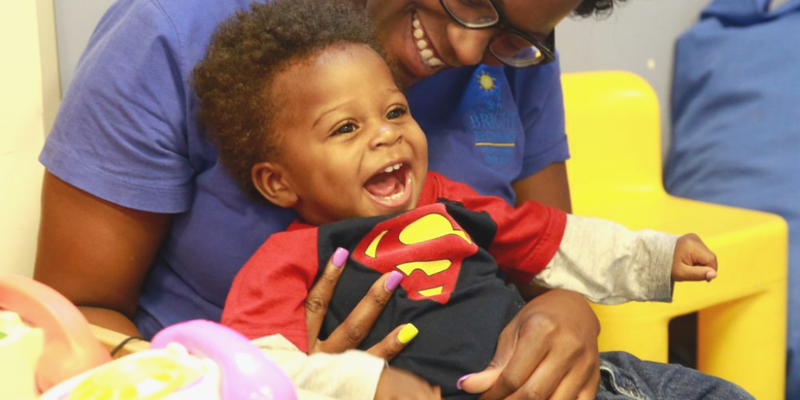
I recently visited Bright Beginnings, an early childhood and family learning center in Washington, D.C. Even the fact that they call themselves a “family learning center” speaks to their emphasis on providing not only a safe and nurturing place for the children in their care, but also a supportive environment for parents.
I had the opportunity to hear Antoine, the father of 2-year-old Amir and a current college junior himself, speak about the importance of Bright Beginning’s fatherhood program. This group of fathers meets weekly to talk about the joys and challenges that come with being a father. They provide support to each other so that they ultimately can all enhance their personal and parental development.
Bright Beginnings redefines what it means to focus on “family engagement.” It’s holistic and central to everything they do. Research has shown that children with engaged families earn better grades, complete high school at higher rates, and are more likely to enroll in postsecondary education. And just as it’s important with a child’s education that the foundation is laid in the earliest years, so too does the foundation for family engagement get built when a child is very young.
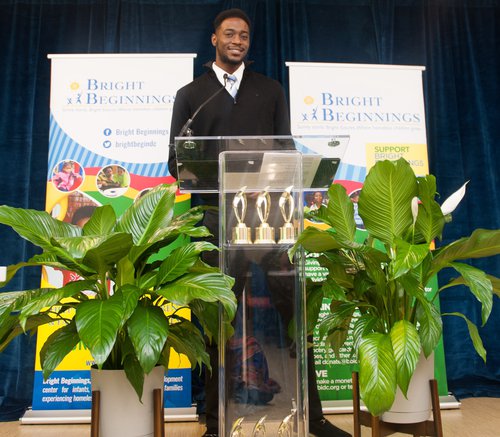
When asked what he’d like to see philanthropy do to support more families in D.C., Antoine shared that he’d like to see more Bright Beginnings throughout the city. I, too, hope that more families have access to the types of support that Bright Beginnings offers. Yet, we have a long way to go before every family has a holistic, two-generation center in their neighborhood. Furthermore, different families living in different geographies and circumstances have varying needs and varying desires for how they prefer to connect and engage.
Parents of my generation are different from that of my parents — not surprisingly — and a lot of that has to do with growing up in the digital age. Gen Y (millennials), born between 1980 and 1994, witnessed the introduction and rise of social media, instant messaging, smartphones, search engines, and mobile. Generation Z, born between 1995 and 2012, some of whom are just becoming parents now, are used to being constantly connected with curated information. As parents, Gen Y and Gen Z expect on-demand information and services, as well as social connections that will support their family engagement needs. Seventy-one percent of millennials value advice from parenting blogs, websites, and social media.
Both because of what we know about the impact of family engagement on children and families and because we see great opportunity to reach today’s parents in new ways, Omidyar Network is committed to supporting solutions for both generations that help parents and caregivers provide more engagement, connection, and learning for their young children, either through tech-enabled services or in-person services, or more likely a combination of both! There are a number of exciting trends we are seeing in this area, including solutions targeting those that lack access to more traditional preschool resources and centers like Bright Beginnings, especially in rural areas.
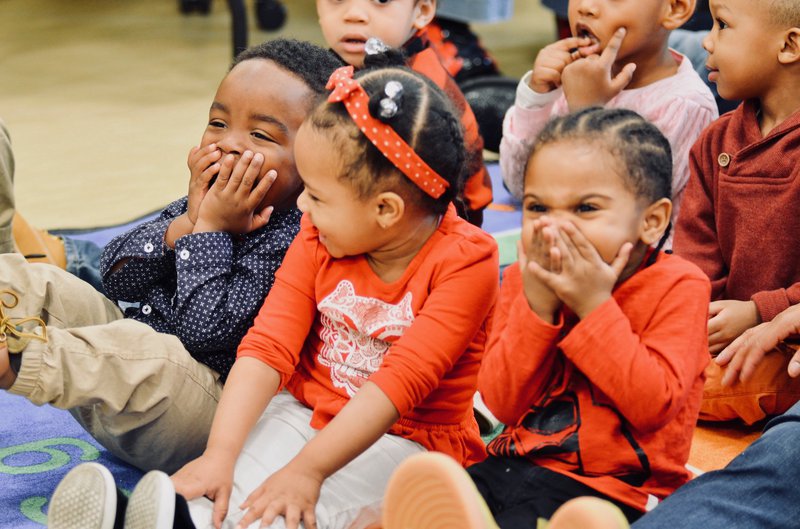
Filling Gaps in Early Learning Access
There are 2.2 million children in the United States without access to publicly funded early education, and over half of low-income children have no preschool option at all. Access barriers like program availability, quality, transportation, and cost disproportionately affect low-income, minority, and rural learners. Further, parent choice leads many families to want to keep their children at home until they enter kindergarten. Waterford UPSTART meets these gaps by providing an at-home early learning program that focuses on reading, math, and science, and most importantly, empowers parents as the child’s first and most influential educator.
Through the Waterford UPSTART program, 4-year-olds spend 15 minutes per day, five days per week on their reading curriculum and then move on to math and science if they choose. Waterford UPSTART recognizes parents as the key lever in a child’s school readiness, and respects their choices about how they want their child to get there, alongside meeting their personalized needs with human support. Parents are paired with a personal coach that helps them navigate support for their child as they move through the software, as well as supporting and advising them on school readiness, early routines around learning, and skill and socio-emotional development that can be boosted through the parent-child interactions.
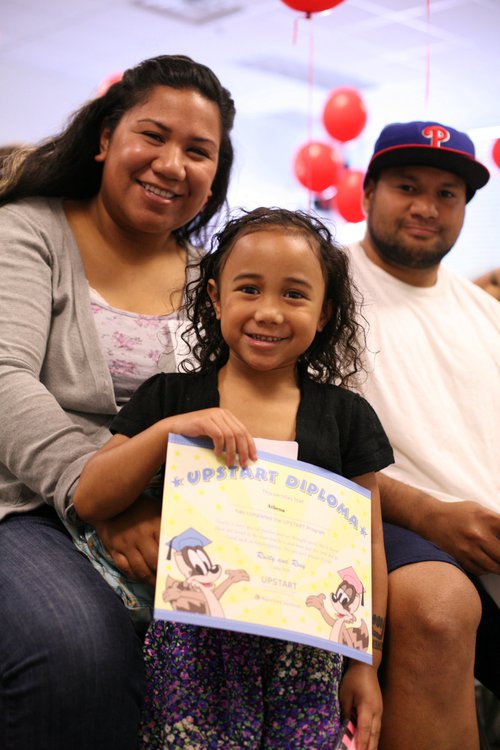
The best part is that they are seeing strong results. Waterford UPSTART has been validated by eight years of rigorous external evaluation, which shows more than 91 percent of children who use it in the year before kindergarten are ready for school — compared to a 65 percent average nationwide and 48 percent for children from low-income families — and the results are lasting, with a longitudinal study showing children outperform their peers on state standardized tests in literacy skills all the way through fourth grade.
Given the program has demonstrated to be so effective, Waterford UPSTART has also been used within center-based preschools to supplement site-based work, such as a Head Start program in Mississippi. It provides our littlest learners with a cognitive boost at home and further encourages parent engagement.
We have also seen great results through leveraging behavioral insights to nudge parents and caregivers about their interactions with children.
A Behavioral Boost
Many families have the motivation to help their young children build their brains, but may not know exactly what to do or how to fit complex activities into their busy lives. ParentPowered (Ready4K) is an evidence-based family engagement curriculum delivered via text message. Each week, parents and caregivers receive fun facts and easy tips on how to promote their children’s development by building on existing family routines — like pointing out the letters on shampoo bottles during bath time and naming their sounds, counting the number of steps as you walk to the car or bus, or making feeling faces in the mirror after you brush your teeth. The ParentPowered curriculum integrates itself into a family’s day-to-day life.
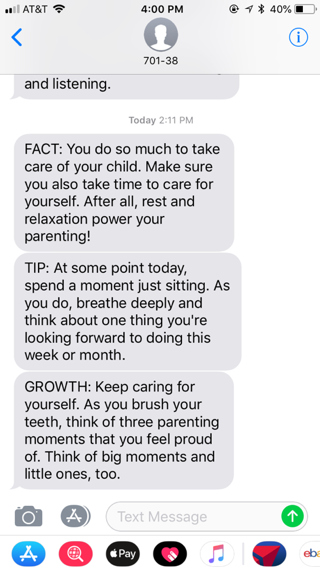
Like Bright Beginnings, the curriculum doesn’t only focus on the child. It also appreciates the stressors that can come with being a parent. One week’s sequence of texts (shown left) explicitly focuses on parental self-care and stress management.
For those families that need a behavioral boost, ParentPowered offers a highly scalable program that is delivered in partnership with early childhood centers, community-based organizations, school districts, and more. In a series of randomized controlled trials, this approach has been shown to increase child development by two to three months over the course of a school year, covers birth through third grade, and is available in English, Spanish, and Arabic.
Beyond boosting learning, some parents are looking to learn from other parents through social connections.
A Virtual Support Group
Peer-to-peer parent engagement has been on the rise with products such as Winnie, an app and website that makes it possible for parents to connect, share, and learn from each other online. As the company states, Winnie provides “inspiration and insight for modern parents.” Parents can ask questions and receive advice from other parents on topics ranging from diapering to the cultural challenges that are still present for fathers trying to find activities that aren’t labeled “Mommy and Me” to the guilt that parents feel going back to work after their children are born. In some cities, they can also search for local child care and preschool options. For busy parents who need a boost of support or a quick question answered, Winnie provides a virtual community for them to find that answer.
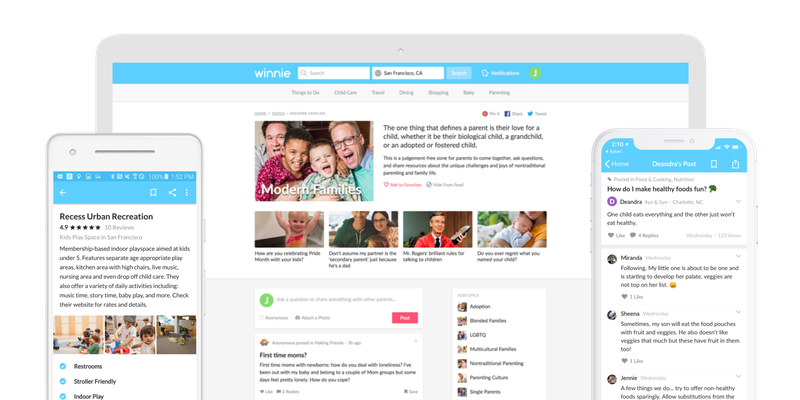
Perhaps even more importantly, Winnie’s community helps struggling parents with a reminder that they are not alone. One of the most frequent types of questions asked on the site starts with a problem that a parent is having and ends with: “Am I alone in this?” What follows is generally an outpouring of comments from other parents sharing that they too are in a similar situation and that parenting looks different for everyone followed by words of encouragement. Sometimes we all just want to feel like we aren’t the only one, and Winnie provides the community that brings parents together.
It Takes a Village
Whether it’s an in-person father’s group at Bright Beginnings, a text-based nudge through your phone, a personal coach on the other end of a phone call, or another parent sharing that we are all in this together through an online community, these are all united by a common theme that parents and families need support. They need support in parenting advice, but they also need encouragement from others and care for their own health and well-being. Even in our modern world, it still takes a village to raise a child. Thanks to our modern world, we have the ability to innovate in new and exciting ways to create that village.
For more information on trends in early learning and emerging technologies that are enabling new approaches and solutions, please see Omidyar Network’s Big Ideas, Little Learners report.